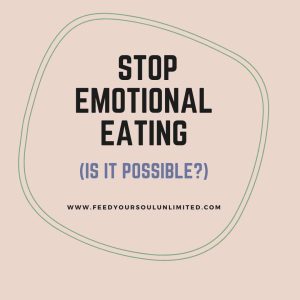
What do you need most to stop emotional eating?
I get asked this a lot.
Do you know that you unknowingly sabotage yourself with food? You engage in behaviors that lead you to overeat!
Emotional eating can be challenging to stop, but there are several things you can do to lessen it.
The first step is to become aware of your emotional triggers for eating. Ask yourself if you’re eating because you’re hungry or if you’re using food to cope with emotions such as loneliness, stress, boredom, anxiety, or sadness.
The second step is to learn AND use healthier coping mechanisms. Identify strategic ways to deal with emotions, such as exercise, meditation, reading, or talking to a friend or therapist.
The third step is to practice mindful eating by paying attention to the taste, texture, and smell of food, and eating slowly and without distractions. Eating mindfully helps you be connected to your body and all the physical triggers to eat.
You can unknowingly sabotage yourself with food, by not recognizing and stopping the root of the problem:
- Eating to deal with emotions can lead to dissatisfaction with your body and yourself. When you eat emotionally, you are not dealing with the emotional problem, you are making the problem worse.
- Restrictive dieting and depriving yourself of certain foods can lead to intense cravings and binge eating. Limiting ourselves makes the rebel side come out and what to eat what it wants.
- Skipping meals and limiting food can lead to overeating later in the day, especially if you’re hungry and tired.
- Judging yourself and your behavior creates a negative mindset. This negative mindset starts a cascade of negative reactions that include overeating.
What can you do to create more food freedom?
First, practice Intuitive Eating. Learn to listen to your body’s hunger and fullness cues. Give yourself permission to eat all types of foods starting when you are hungry and ending when you are satiated or full.
Second, surround yourself with people who support your goals and create a positive and supportive environment at home and work. Hang out with people who are listening to their bodies and do not engage in diet talk.
Third, practice Self-Care. Take care of your physical, emotional, and mental health by getting enough sleep, eating good food, managing stress, and engaging in activities that bring you joy.
Fourth, seek help if you are struggling. Join a program where the focus is on Intuitive eating. If you’re struggling with emotional eating, consider seeking help from a therapist or registered dietitian who specializes in this area.
Want to get out of the cycle of yo-yo dieting and end emotional eating? We are having a live round of our signature program Emotional Eating Solutions. Check us out to save your spot. https://feedyoursoulunlimited.com/emotional-eating-solutions-self-study/
Kim McLaughlin, MA is a Psychotherapist, Speaker, Author, and Coach who specializes in working with people who suffer from binge eating and emotional eating. She is a Certified Intuitive Eating Counselor. She is the author of the best-selling book Feed Your Soul Nourish Your Life! A Six Step System to Peace with Food and the Amazon #1 Best Selling book Discovery Your Inspiration.
You can find Kim on her podcast Feed Your Soul with Kim and you can find it on all podcast platforms.
Wondering if you are an emotional eater? Sign up for the free Am I an Emotional Eater Quiz.
